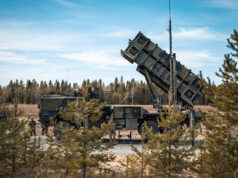The UK and northern European allies have agreed to establish a multinational group of experts to tackle Russian disinformation, say the MoD.
Armed Forces Minister Mark Lancaster led discussions on the subject according to a news release, stating the importance of getting on the front foot against disinformation and warning that the threat of hostile and brazen disinformation is increasing.
Armed Forces Minister Mark Lancaster said:
“As NATO’s biggest exercise in a decade draws to a close, it is clear we are best equipped to deterring threats when working side by side with allies and partners.
However, we face more than just the conventional threats of old, which is why the UK plays a leading role in all areas of defence including debunking the kind of hostile disinformation we saw from Russia following the tragic attack in Salisbury.”
Russia is at the forefront of information warfare in the modern age, utilising an array of organisations and strategies to spread disinformation to further national strategy but how are they doing it?
Every now and then we come across a report from one of the many Russian state broadcasters that have more than remarkable headlines revolving around military equipment and it seems fairly obvious that the piece has a clear agenda but why is this being done?
They were false but the rumours had begun spilling into conventional news media. Numerous analysts and experts in intelligence point to Russia as the prime suspect, noting that preventing NATO expansion is a centrepiece of the foreign policy of the nation.
Even the UK Defence Journal has been contacted by various Russian based ‘news organisations’ looking for soundbites whenever we publish a story about an MoD blunder or questionable government decision.
The flood of inaccurate stories is so strong that both NATO and the European Union have established special offices to identify and refute disinformation.
The most effective instrument in this effort appears to be Russia Today, the organisation has been frequently described as a propaganda outlet for the Russian government and media regulator, Ofcom, has repeatedly found RT to have breached rules on impartiality, and of broadcasting “materially misleading” content.
In the paper ‘Computational Propaganda in Russia: The Origins of Digital Misinformation’ Sergey Sanovich argues that the digital propaganda of the Russian government seeks to insulate Putin’s leadership from any domestic challengers and aid in his foreign policy ventures, which increasingly sets Russian interests off against the West.
The study argues that the propaganda tools, including trolls and bots, were conceived and perfected in the pockets of political competition and a globally integrated market economy still left in Putin’s Russia.
“It’s argued that Russia could be on a mission to restore its Soviet or imperial glory and to prevent liberal democratic values from taking root in the Russian political system.
Yetthe tools used are precisely the ones developed in the most internationally competitive part of the Russian economy that emerged during the liberal 1990s and (until recently) was not subject to heavy-handed interventions by the government: the online media and tech sector.”
The paper concludes that the fact that bots and trolls thrive in the low-trust, anything goes, prove-it-on-the-spot environment. People share sensational and alarmist headlines without much verification more often on social media than any other medium.











‘Even the UK Defence Journal has been contacted by various Russian based ‘news organisations’ looking for soundbites ‘
I hope you have a back door to the MOD so you can advise them of anything of interest.
The way to deal with this is to fight fire with fire. More specifically it largely needs to be done within Russia itself…. but not only by Russians themselves.
In the UK, Russia Today and Sputnik and any other such media organisations should be shutdown in the UK. Russia will respond by saying it’s against freedom of speech, i.e. using our own morals against us. It doesn’t matter. Shutting these outlets down doesn’t go against freedom of speech, it’s simply self defence. Furthermore, where possible, Russia should simply be ignored. No news about it. Use their tactics against them.
Russia’s only strength (a big one) is it that it has lots of nukes, besides that it is weak in almost every aspect. Yes, it has masses of resources, but it is too inept to know how to use them, and with 70% of the county’s wealth lying in the hands of only 1% of the population, many in power are more interested in keeping their positions, which in essence keeps the country weak.
I fined it disgusting people on here who would rather have a go at europe and forget the problems Putin has caused this counrty for example Novichoks,,Shame on them.
The best defence in this is the education system and ensuring voters in a modern democracy are equipped for the modern age of information and understand the responsibly of casting a vote and both the opportunity and danger this represents to their nation.
If we spent a bit of time actually teaching our voters skills that they need in validating information sources and using multiple sources it would strengthen our democracies no end.
The west’s biggest strength is sufferage and freedom of speech, but in the Information Age These are also potential weaknesses. You can put in place controls on information but this will impact on freedom of speech. The best defence is a voting population who understand how to review an information source and use multiple sources of information before making a decision and voting.
It’s not hard to check information, it’s just a learn basic skill and an awareness that it’s important you do it.